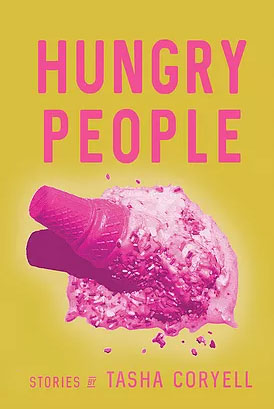Hungry People by Tasha Coryell / Split Lip Press / 978-1721553457 / 212 pages / August 3, 2018
 On the cover of Tasha Coryell’s debut short story collection, Hungry People, a bright, monochromatic pink ice cream cone has fallen to the floor and is melting. It is a sloppy, but beautiful mess. This image is much like the characters in the book, all deeply flawed, but so truly human as to draw the reader in rather than alienate. The stories in this collection are not linked by narrative, but all share a common theme of “hunger,” a word that takes on various meanings as the book progresses.
On the cover of Tasha Coryell’s debut short story collection, Hungry People, a bright, monochromatic pink ice cream cone has fallen to the floor and is melting. It is a sloppy, but beautiful mess. This image is much like the characters in the book, all deeply flawed, but so truly human as to draw the reader in rather than alienate. The stories in this collection are not linked by narrative, but all share a common theme of “hunger,” a word that takes on various meanings as the book progresses.
Coryell shows an astute understanding of human behavior and desires, even when her characters do not understand exactly what they want. In “Mr. Skull,” a high school teacher and football coach visits Russia, along with his wife, with the intent of adopting a special needs child. When the child they meet ends up being aloof and unhappy, the Skulls do not move forward with the adoption.
“It wasn’t as though he thought she would break into a smile upon meeting them, say, “My family!” She couldn’t say that because she didn’t speak English. Instead he had thought that she would break into a smile and say, “Mоя семья,” which was the translation of “my family” in Russian that Mr. Skull has looked up on the internet.”
Mr. Skull continues to progress in his career, but as the small imperfections in life continue to pile up, we are left with a man at the end of the story so thin that his bones are beginning to show through his skin.
The needs of the characters in Hungry People are often complex and multi-layered. In “The Delivery Driver,” the protagonist is physically hungry, comforted by food and also perpetually lonely and in need of human contact, which she receives from her regular delivery driver.
Women are often central to the narratives contained in the collection, but they are neither idolized or victimized. Coryell writes women who are complicated, messy and wonderful. In “Skinny Girls Get Devoured Quickly,” a maid attempts to murder her boss’s girlfriend, only to learn that he was having an affair with other women. After that revelation Coryell writes, “…I think of the way he grabbed me. My skin like something precious. My skin that can contain something more than bones.”
At times, it feels as if a story in the collection is headed into the speculative fiction realm, but the narrative always remains plausible, if not a bit absurd, which is perhaps more terrifying. “Fever” is a tight, athletic piece that does exactly that. In it the narrator bonds with a man over their shared love of food, but the man soon becomes cold and distant, not just emotionally, but also physically. He refuses to turn on the heat in his apartment during the winter, but also avoids staying at the narrator’s apartment. She goes to extreme lengths to bring the man closer to her, ultimately failing in her quest an unforgettable way.
There is a commonality to the endings in this collection. Each narrative is complete and satisfying, yet leaves the reader with the feeling that more could come. In this sense, the form takes on the subject matter. After all, hunger can only be satiated temporarily. It keeps returning, again and again.




Leave a Reply